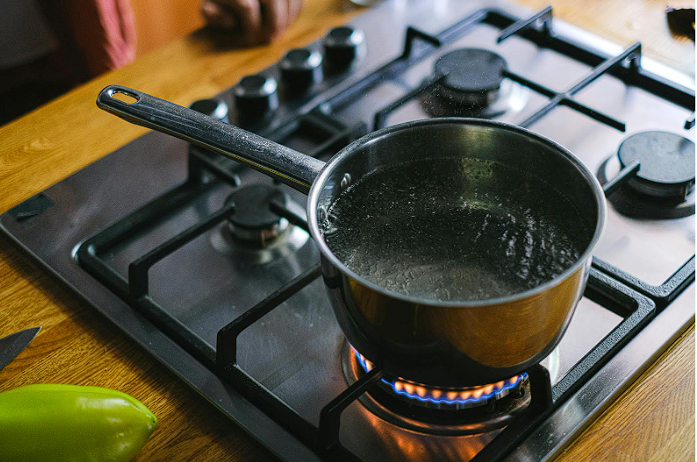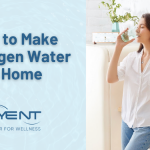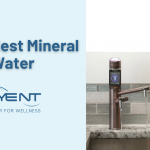Key Takeaways:
- Just because water looks, smells, and tastes normal doesn’t mean it’s safe to drink.
- Knowing how to purify water naturally is an important step in protecting yourself from the acute and chronic illnesses caused by drinking unfiltered water.
- There are several different ways to purify water naturally, but most are limited in the level of protection they can provide against contaminants.
- The best way to purify water naturally is with a Tyent water ionizer. Tyent’s cutting-edge filtration system turns ordinary H2O into the safest, cleanest, healthiest water to drink.
Clean, contaminant-free drinking water is essential for your health and survival, yet access isn’t always guaranteed. Whether you’re on a hiking trip, dealing with a waterborne outbreak, or would rather not rely entirely on public water systems to keep you safe, knowing how to purify water naturally is a vital skill.
From ancient methods to innovative solutions inspired by nature, there are various ways to make water safer to drink. This guide explores effective natural techniques to remove contaminants from source water, ensuring you always have access to the best water to drink possible—both at home and on the road.
Why is it Important to Purify Water?
Water that looks, smells, and tastes normal isn’t necessarily safe to drink. Purifying your drinking water acts as an important layer of protection that provides the following benefits.
Eliminates Harmful Microorganisms
Water purification is crucial in preventing the spread of waterborne infections, such as adenovirus, norovirus, salmonellosis, and hepatitis. Without proper purification, harmful microorganisms like these can cause stomach pain, diarrhea, vomiting, and breathing problems, among other symptoms.
Removes Contaminants
In addition to protecting against bacteria, viruses, and parasites, drinking purified water reduces your exposure to chemical contaminants and the health problems they can cause. Chemical contaminants may be naturally occurring or man-made. Examples include nitrogen, bleach, pesticides, metals, and pharmaceuticals.
Improves Taste and Odor
The look, smell, and taste of unfiltered water can be unpleasant and unappealing. When your drinking water doesn’t contain sediment or smell like chlorine, for instance, it’s more enjoyable to drink and therefore easier to hit your recommended H2O intake. Water purified with a Tyent water ionizer, in particular, tastes so clean and refreshing you won’t want to hydrate any other way.
Prevents Illness
Drinking purified water doesn’t just protect you from the acute health effects of contaminated water, but serious medical conditions that can manifest as a result of long-term chemical exposures. Depending on the type and concentration of chemicals in the water, how much you consume, and how long you’re exposed, chemical contaminants can lead to severe chronic health problems, including nerve disorders, organ damage, and cancer.
Ensures Safe Hydration
The World Health Organization deems drinking water as “safe” if it doesn’t represent any significant risk to a person’s health over a lifetime of consumption. However, the Environmental Working Group notes that many of the 324 contaminants detected in the U.S. water supply far exceed levels scientific studies have found to pose health risks.
Your local water quality affects your life. Purifying your water keeps you and your family safe from the out-of-date government regulations currently plaguing the U.S. tap water system.
For the best alkaline water filter systems available, look no further than Tyent water ionizers. Every Tyent machine comes fully equipped with a dual Dialapure filtration system that removes over 200 dangerous contaminants, including heavy metals, pharmaceuticals, and 100% of lead from your drinking water. With a Tyent water ionizer, you’ll know that every sip of H2O is safe and healthy.
How to Purify Water Naturally
To improve the quality and safety of your drinking water, it’s important to learn how to purify water naturally. These are the most common natural water purification methods.
1. Water Ionizers
Water ionizers are small appliances that increase the pH level of your drinking water to make it more alkaline, which boosts its health benefits. Some alkaline water benefits include more energy, better skin, and a stronger immune system.
Many ionizers contain built-in filtration that purifies your drinking water before adjusting its pH, with Tyent leading the charge. In addition to Tyent’s advanced 0.01-micron filtration system, which is the same level of filtration used in kidney dialysis machines, Tyent offers a variety of advanced pre-filters to improve the quality of your source water and extend the life of your main filter. An at-home water test can help you choose the right ones for your source water.
Unlike other water ionizers that require chemicals to achieve high and low pH levels, Tyent water ionizers offer the widest range of pH level settings and are chemical-free.
Always have access to the cleanest and healthiest drinking water with a Tyent water ionizer.
2. Boiling
Boiling water is a simple method for those who want to purify water naturally. It’s a handy purification method to have on standby when you’re hiking, camping, traveling, or following a natural disaster. Boiling water rids it of disease-causing organisms, including bacteria, parasites, and viruses.
Bring water to a full rolling boil (where bubbles appear in the center and don’t disappear when you stir it) for at least one minute. Boil for at least three minutes if you’re at an elevation above 6,500 feet and a minimum of five minutes if your water’s cloudy or contains debris. Allow the water to cool before you use it.
Unfortunately, boiling water isn’t effective for keeping lead out of your drinking water or other chemical contaminants, like heavy metals, pharmaceuticals, or pesticides.
3. Solar Purification (SODIS)
Solar water disinfection (SODIS) is a natural water purification technique that uses sunlight to improve the quality of water. The UV radiation and heat kill pathogens present in the water, such as bacteria and viruses.
As for how to purify water naturally using SODIS: Fill clear 0.3-2.0 liter plastic bottles with water, shake them to oxygenate, then lay the bottles on their side in the sun for a minimum of six hours (if sunny) and two days (if cloudy).
SODIS doesn’t work on cloudy, opaque water, and does nothing to help with chemical contaminants that may be in the water.
4. Charcoal Filtration
Activated charcoal filters (also known as carbon filtration) work through the process of adsorption—where impurities are trapped by the filter rather than absorbed into it. Charcoal filtration is effective in removing chlorine, pesticides, herbicides, and most heavy metals, but lacking when it comes to ridding water of microorganisms.
The two most common types of carbon filters are powdered block filters and granular activated filters. Block filters are generally more effective because of the increased surface area of the carbon.
Carbon filters are available for everything from whole-home filtration systems to water ionizers to water bottles. There are even straw-style carbon filters for hiking and camping.
5. Sedimentation
Sedimentation traps and removes dirt and other debris from entering your water supply. How much depends on the filter’s micron-rated capacity. If your sediment filter has a micron rating of 3, for instance, then it will filter out all substances that are larger or the same size as the rating. The lower the rating, the more debris will be filtered out.
Adequately purifying drinking water requires a micron rating of less than 1, so a sediment filter alone won’t cut it. (For context, Tyent water ionizers feature a 0.01-micron filtration level—the same level as kidney dialysis machines.) Sediment filters don’t effectively remove heavy metals, nitrate, pesticides, or microbial contaminants. They’re best used as a pre-filter for other more advanced filtration methods.
Take Tyent’s WIT Sediment Filter: The depth filter removes dirt, sand, and sediment from your source water, protecting the health of your plumbing and extending the life of your water ionizer’s filter. It’s simple to install and has a service life of one year or 3,000 gallons.
Get long-lasting sediment filtration with a Tyent WIT sediment filter.
6. Distillation
Distillation is a water purification process that involves boiling water until it turns into steam. The steam is collected in a separate container and cooled down back to its liquid form, resulting in exceptionally clean water.
The process of distilling water is lengthy. It starts with filling a pot halfway with water and then placing a bowl inside the pot. The bowl should be smaller than the pot and float in the water, rather than touch the sides or sink to the bottom.
Next, heat the water to boiling and place a lid over the pot upside-down. The lid for the pot should be curved so that as the water condenses, the steam collects at the center and drips into the bowl. Filling the lid with ice can help to speed up this process.
Once the water has all evaporated, remove the pot from your heat source and let it cool. Take out your bowl of distilled water and pour it into a clean container.
Not only is distilling water yourself complicated and time-intensive, but the process goes too far, removing beneficial vitamins and minerals too. As a result, drinking distilled water long-term can lead to nutritional deficiencies and put you at risk of health problems over time, including chronic cavities and osteoporosis.
7. Plant-based filtration
Plant-based filtration involves purifying your water with filters made from renewable and biodegradable sources, such as coconut shell carbon, which reduces the carbon footprint of keeping your water clean. They’re available for use in water pitchers and carafes, coffeemakers, and whole home filtration systems. Some water bottle brands also feature plant-based filters for safe and sustainable drinking water on the go.
Depending on the type, plant-based filters tend to be effective at removing chlorine, VOCs and other chemicals, as well as unwanted tastes or odors. However, they may not be as effective at eliminating bacteria, heavy metals, or excess minerals and may have a limited lifespan, requiring them to be changed more frequently.
8. Tablets or Drops
Water purification tablets or drops are another option for those deciding on how to purify water naturally. They contain chemicals known for killing waterborne organisms—usually, iodine or chlorine dioxide. Use them according to the manufacturer’s directions, dissolving the amount recommended for your container size in the water and letting it sit for at least 30 minutes before drinking.
Using tablets or drops comes with a few caveats, starting with their inability to remove sediment and heavy metals. If the water is contaminated with a chemical, disinfectants won’t make it drinkable either. They’re also not effective against all microorganisms found in water, especially resistant ones like Cryptosporidium and Giardia parasites.
More About How to Purify Water Naturally
Below are answers to frequently asked questions about how to purify water naturally.
What is the healthiest way to purify water?
The healthiest way to purify water is by using a Tyent water ionizer, which features an NSF-certified 0.01-micron medical-grade filter that removes over 200 contaminants from your drinking water, including heavy metals, pharmaceuticals, and 100% of lead.
Tyent water ionizers are the best hydrogen water machines, transforming ordinary H2O into hydrogen-rich alkaline water that’s packed with antioxidants—the amazing benefits of which include more energy, less brain fog, and better skin.
What’s the cleanest way to drink water?
Hydrating with H2O dispensed from a Tyent water ionizer is the cleanest way to drink water. It’s also the healthiest. Every Tyent water ionizer features a dual Dialapure filtration system—the same level of filtration that’s used in kidney dialysis machines! It filters over 200 dangerous contaminants from your source water, including 100% of lead.
As for the health perks, Tyent alkaline water contains the highest concentrations of molecular hydrogen in the water ionizer industry. The benefits of hydrogen water are vast and include free radical protection, better digestion, and improved metabolic health.
Does boiling lake water make it safe to drink?
Boiling lake water makes it safer to drink, but doesn’t rid the water of all potential health risks. A rolling boil for at least one minute—or at least five minutes if the water’s cloudy or contains debris—does kill bacteria, parasites, and viruses. However, boiling won’t remove other contaminants from lake water, like heavy metals, pharmaceuticals, or pesticides.
Discover the Best Way to Purify Water Naturally
With hundreds of contaminants going unmonitored in the water supply, knowing how to purify water naturally is an important step in protecting yourself from the potential health problems unfiltered water can cause. However, most purification methods aren’t thorough enough to ensure safe hydration. Investing in a Tyent water ionizer isn’t a luxury, but a necessity.
Tyent water ionizers turn ordinary H2O into the safest, cleanest, and best water to drink. Tyent’s dual Dialapure 0.01-micron medical-grade filtration system removes over 200 dangerous contaminants from your tap water, including heavy metals and 100% of lead. Tyent also offers custom pre-filter options to maximize the quality of your source water.
Not only do Tyent water ionizers filter your drinking water, but transform it into hydrogen-rich alkaline water that’s packed with antioxidants. What does this potentially mean for your health? More energy, less brain fog, and radiant skin—and that’s only the beginning.
Take a Tyent water ionizer for a spin and see for yourself. Tyent offers a generous 75-day trial period to make sure you’re 100% satisfied with your purchase.




